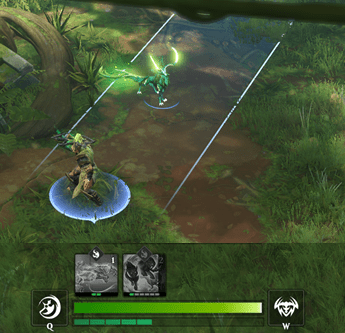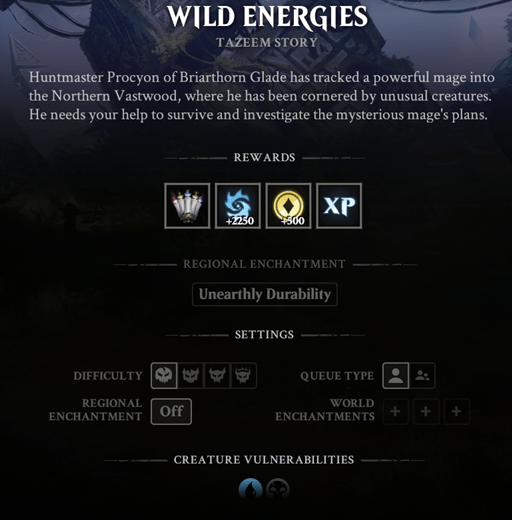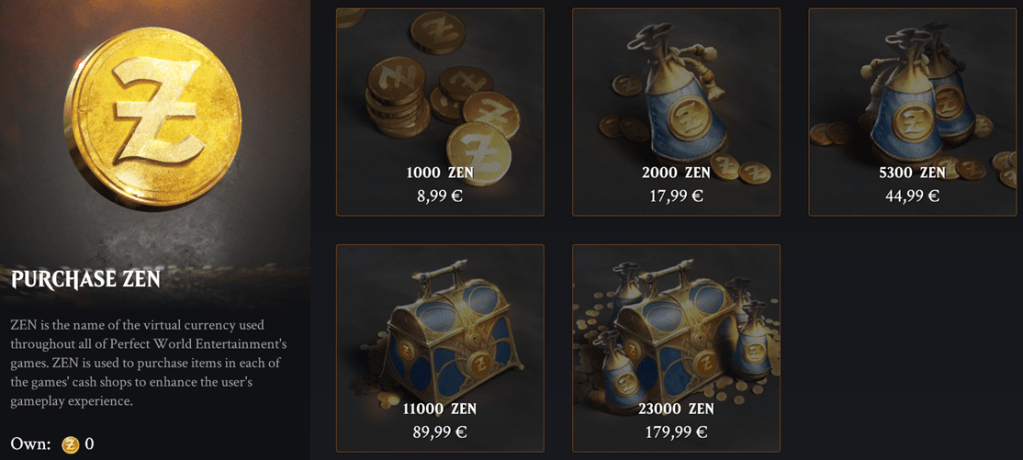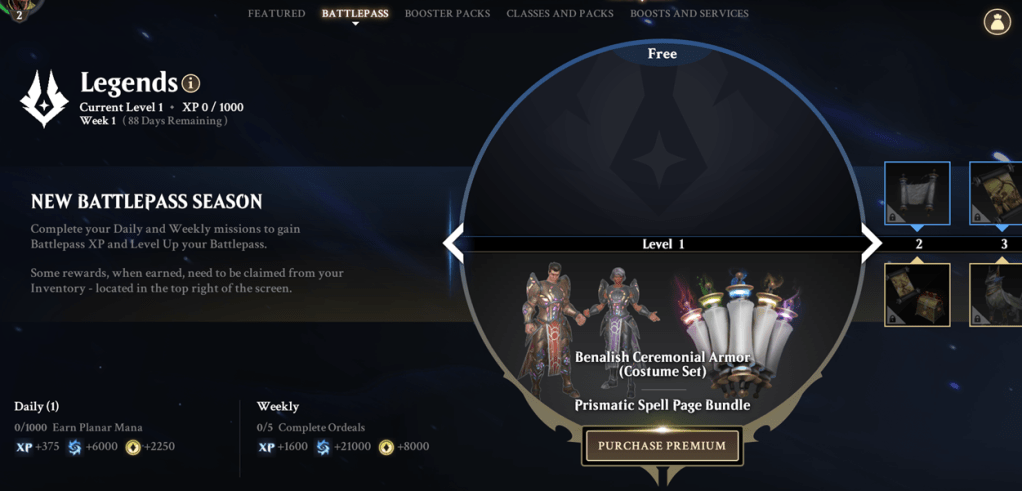Trending
Opinion: How will Project 2025 impact game developers?
The Heritage Foundation's manifesto for the possible next administration could do great harm to many, including large portions of the game development community.

Featured Blog | This community-written post highlights the best of what the game industry has to offer. Read more like it on the Game Developer Blogs or learn how to Submit Your Own Blog Post
Quick analysis & predictions about Magic Legends, the latest MMORPG by Cryptic Studios & Perfect World Entertainment based on the Magic: The Gathering universe.


Last week, Magic Legends (an Action RPG MMO based on the Magic: The Gathering universe) started it’s Open Beta period, and as a good MTG fanboy I had to try it out.
After several hours casting spells and travelling through planes killing everything that had a health bar, I think I’ve seen enough to have a general idea of the game mechanics and what intentions for the game are.
So in case you’re still wondering if you should play or just want to know the basics, here is my quick analysis and predictions:
For those that are not familiar with it, we can define Magic Legends as a free-to-play Diablo-like MMORPG based in the popular Magic: The Gathering collectible card game (about which I’ve already spoken at my blog).
The game is available in PC in several stores including the Epic Store, and is expected to be released later in this year in Playstation and Xbox.

Magic Legends has a look-n-feel which strongly remind Diablo and other Action RPGs (isometric pov, click-to-attack, etc).
The game is the latest MMO’s developed by Cryptic Studios (Star Trek Online, Champions Online…), which is subsidiary of Perfect World Entertainment (a games publisher specialized on free-to-play MMORPGS).
These folks have released tons of MMOs, and are among the biggest experts on this genre in the industry right now.
A bit surprisingly, coming from devs used to employ a similar formula for many of their games, Magic Legends either simplifies, removes or hides some features that are standard of MMORPGs like Guilds, Crafting, Item Looting or Tradehouses.
Instead, it puts a huge focus in the action gameplay and character progression.
The game has a bit of an frankenstein design, since it mixes mechanics from MMORPG, Action RPG and CCG:
From Action RPG, it gets the combat system, which requires a high level of micromanagement and a high actions-per-minute (APM) ratio.
This is primarily because the player needs to target enemies and attack by clicking on them repeatedly (because the game doesn’t lock enemies. Players need to click for every attack, like Diablo), as well as cast a range of skills that are as demanding in terms of timing, positioning as they would be on a MOBA.
A peculiarity compared to most other Action RPGs is the game features a lot of spells which summon companion creatures which help you on the fight until killed.
A negative point is that the visuals of the game make it a bit difficult to spot enemies, which sometimes are too well camouflaged with the environment.
This is particularly problematic because the game requires players to be constantly tapping on enemies to attack.
The game could’ve benefited from adding cell-shading graphics or some clear outline on units (like League of Legends does), which would help make them more recognizable.

An example of micromanagement: The Rending Throw (Q) skill of the green planeswalker launches a spinning axe to the enemy and requires the right position to hit multiple enemies. Similar to this, many of the abilities require dexterity to maximize its value.
From MMORPG, it gets both the instanced dungeons system that players can raid and grind solo or with others, and a range of upgrade axises (Equipment, Artifacts, Traits…).
Interestingly, the game seems to lack the looter component on the instances: Enemies quickly disappear once killed, not dropping items, gold, etc. Instead, it’s finishing instances which grants rewards.
This makes balancing easier (designers can put infinite enemies without having to worry about the potential dropped rewards), but can make the dungeons a bit unexciting, and can potentially remove the key interaction of players having to decide who keeps the looted stuff.

Instanced Dungeons example: Previously completed levels can be replayed with different difficulty & conditions. A way to maximize content value used in Gameloft’s Dungeon Hunter 5 too.
From collectible card games (CCG) it gets spell deckbuilding, which is the most original and innovative feature of Magic Legends.
What’s that? On top of the couple of class-based skills, the player has a set of casteable spells, which are inspired by the actual cards of the CCG.
The spells loadout of the character (deck) can be reconfigured before the mission, so characters of the same class may have very different skills based on the cards they’ve collected and added to the deck.
Another interesting point of this deck is that the spells are not available all of the time: At any given point, the player has up to 4 spells available (like her hand in MTG). Once the player casts a spell, its slot will be refilled with a new random card from the deck.
So, as you can see, this does have a strong inspiration from the Hand & Deck relationship of the card game.
A final point is that all these card spells have a different mana cost (which gets filled over time), and so introduces an additional layer of complexity on deckbuilding, based on having to mix less useful cheaper cards to help cycling, and managing the fact that cards may require mana from different colors.

Deckbuilding in Magic Legends is more complex than skill setups on most MMORPGs and Action RPGS: The player has to consider spell mana cost, colors, etc…
A lot of the mechanics presented above seem quite exciting at a first glance, especially the idea of deckbuilding your skills. Unfortunately, several of these mechanics look better on paper than on reality, and the design has been very criticised by fans.
Some of its issues are:
Lack of control: The draw cards mechanic makes character usage very difficult. Sometimes all I’ve are healing skills available and I’m casting them just to cycle them out until I draw an offensive or creature spell.
This makes the system very frustrating, and as a player I’d prefer to limit my deck to avoid any card rotation at all.

On top of this, because the spells belong to a color, they’ll have a similar appearance. So when presented on a small icon on screen and on a position that changes randomly, they’re very difficult to distinguish. A lot of times I’m casting the wrong spell.
Overwhelming micromanagement: Action RPGs and MOBAs are famous for being very demanding on dexterity from their players.
But at least in games like League of Legends or Diablo, the skills of a character are always the same, and they don’t move around, so a player can memorize the positions and combos. This is not possible on Magic Legends.
Having to manage a wide range of semi-random appearing skills hard to distinguish between each other is just the tip of the iceberg of the complexity of the combat system.
The player has to control also their mana costs, the positioning & direction of the character and spell casting, while constantly tapping on enemies to attack, on a high-speed combat… It’s just too much.
Due to this, my prediction is that the deckbuilding & draw system will go away and be replaced by a traditional system: The player will be able to equip ~8 skills, which will be always available with a cooldown.
Excluding the problematic card systems, the combination of fast paced action gameplay on top of MMORPG seem to mix well for a potential PVP mode, although this competitive layer seems to be absent on the game right now.
When it comes to monetization, the balance seems extremely aggressive: The smallest purchasable pack is 9.99$, while the highest is 199.99$, which is definitively not industry standards on free-to-play nowadays.
But it’s not only the packs: Most in-game prices seem to range $10 to $25, which is quite pricey, and the game even aims to to monetize on things like renaming a character, which are elements that in general are provided to players for free in order to fidelize them.
In general, it’s not the kind of balance which fosters that new players establish a long term customer relationship with a game.

Part of the aggressive monetization problem is related to the fact that the hard currency (ZEN) is shared between all the games of Perfect World. Meaning that the ZEN from Magic Legends can be transferred and spent on Star Trek Online. At a first glance, this may seem to add extra value to the currency, but in reality it damages the possibility of adapt the economy of each game to the specifics of each of the games: Star Trek Online, a niche on the latter stages of its lifecycle, will probably require a more whale oriented approach to monetization than Magic Legends, which needs to hook payers and onboard them for a long time. Also, this price range means that the game will not be as effective targeting countries outside T1 (which is odd given Magic’s wide international pull).
A key monetization element which I miss particularly is a subscription model, which is a great monetization tool on games such as Elder Scrolls Online.
On ESO, the monthly subscription is almost mandatory for anyone that wants to play seriously, because it grants benefits (infinite crafting bag specially…) the lack of which severely slows down grinding, but other than that the rest of the purchases are mostly cosmetics (excluding content expansion packs).

Instead of a subscription model, Magic Legends incorporates a Season Pass. This feels less appropiate for a MMORPG because:(1) it doesn’t offer permanent benefits,(2) doesn’t have a monthly paying periodicity and the payment isn’t automatized and(3) doesn’t fit in games with a wide range of different available activities (look, I’ve been playing for 2 hours and I have 0% progression!)
In general, Magic Legends monetization system seems to be very whale oriented (few payers that spend a lot), rather than focused on a regular purchase amount that is affordable by most of the game community.
This is a model similar to Cryptic’s very successful Star Trek Online, but I feel it’s a bad approach on this one, because:
It’s very out of touch with the standard market pricing. MTG: Arena, which we could consider the main game of the franchise, is far cheaper and much more effective at attracting a bigger audience.
My impression is that such high prices will drive out the potential audience.
As an IP, Star Trek has much more recognizable characters than MTG.
This is because the roster of characters in MTG is bigger and with more evenly distributed leadership than on Star Trek.
MTG has had multiple storylines over the course of the years, and switched the starring characters every few years.
Meaning that less hardcore Star Trek fans will recognize Captain Picard skin and a Constellation-class starship like TNG’s Enterprise-D, but lesser fans of Magic may not recognize Garruk, which may even be unknown by those that played on the 2000s, before the character creation.
While perhaps not the most critical issue, I feel that on Magic Legends it’s very evident the weakness of the MTG IP: Fans are in love with the game mechanics, but not necessarily with the characters, the story and its (multiple) worlds.
None of the settings of MTG have been properly explored because the set rotation system makes them dissappear every certain time.
Ultimately, when it comes to worldbuilding, Magic Legends could be any generic fantasy setting. Key characters from the franchise (Nissa, Garruk, Nicol Bolas…) either appear doing brief cameos or are missing completely.
And because the franchise lacks support on other media (no TV & movies, no comics, no novels…), even if they did feature extensively they don’t have recognizable personalities which the players can identify.

Games Workshop was able to popularize its IP and key characters (Primarchs, heroes…) through the best-selling Horus Heresy novels, which featured several top tier writers like Dan Abnett. This created a consistent and very effective overarching narrative on Warhammer 40k. MTG hasn’t achieved that yet.
IMO, without licensing into other media which allows to popularize the characters and setting, the chances for MTG to effectively exploit the IP beyond the main card game will be very limited.
Note: I know that MTG has books & comics, but none of these products has reached the popularity of Games Workshop’s Horus Heresy novels, and therefore in MTG more players are familiar with the gaming mechanics than with the lore, which is the opposite that happens with Warhammer 40k.
We will have to see what happens once the MTG TV series is released, though.
In particular, the beginning of the game & tutorial was quite unexciting: Just a trip through a random dungeon with an anonymous ally, following an anonymous foe.
As a comparison, on Star Trek Online, the tutorial is a series of quests which make you (among other things) fail to defend an entire planet against a Borg invasion.
The game has also gotten some flak due to several issues, which I expect to be fixed before the end of the Beta period.
While I’ve experienced a range of problems (the cinematics felt quite broken, some in-game descriptions were confusing), the bulk of the problems belong to two categories:
Bad performance. I have a RTX 3070 and I have to play on High graphics instead of Ultra because the FPS drop a lot. It doesn’t even run too well on High.
Even in Ultra, the graphics didn’t look very impressive, and I felt that the game was lacking in terms of antialiasing.
Collision & Pathfinding issues. I experienced many problems with enemies and allies getting stuck on a corner due to failed pathfinding and not attacking, and my character trying to run against the wall.
I wouldn’t consider these issues game-breaking, and it’s the type of thing I believe will get fixed during the beta period very soon.
My personal opinion is that the game will eventually grow to a similar size to other products from Perfect World & Cryptic. Although I don’t think that without a radical change in their monetization, gameplay and more areas it can go significatively beyond what the rest of their titles have achieved.
I may have fallen victim to the hype heartbreak, but I don’t think that Magic Legends is (or even aims to be) a massive game that captivates audiences in the same way as World of Warcraft, and creates a new generation of MMORPGS.
I think that the plan for the game is to belong to a second tier MMO like Star Trek Online or Neverwinter Online, and captivate a small segment of hardcore fans from a niche IP. No more and no less than that.
As for the status of the game right now, I’d say that the reception wasn’t positive and clearly has many things to polish (bugs, AI system, the card draw system should be reviewed, performance has to be improved, monetization should be rebalanced…).
But despite the problems the game may have right now, the MMORPG genre is known for its miraculous comebacks: The reception of Star Trek Online, Elder Scrolls Online and, more recently, Fallout 76 was mixed to say the least.
And yet eventually they were able to become much better and successful products.
The MMO genre is akin to a marathon, so it’s hard to judge the future of a game based on its launch.
Thanks for reading this article!
I wasn’t planning to write anything in March (because this month’s article on how to price in-game items has mutated into a talk for an upcoming conference… I’ll keep you posted on this), but I saw the opportunity to write something quick with this game.
Special thanks this time to Ken Landen, Chong Ahn, Steve Palley and the rest of the GameMakers community, which saw an early draft of this and gave me extra feedback & suggestions.
Also, you can add me as a friend in Magic Legends as JBRIOT#11418
Read more about:
Featured BlogsYou May Also Like